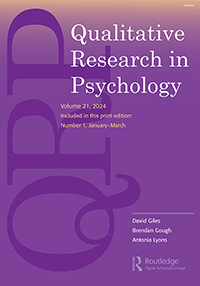Tensions and potentials of involving young people in discourse analysis: an example from a study on sexual consent
IF 4.4
3区 心理学
Q1 PSYCHOLOGY, MULTIDISCIPLINARY
引用次数: 0
Abstract
ABSTRACT Involving participants/intended audiences in discourse analysis may help to avoid overemphasising the structural effects of discourse and silencing participant voice. Yet, involving participants in complex analytic processes effectively can prove difficult. In this study, the authors undertook a Foucauldian discourse analysis of sexual consent material within eight (predominantly UK) wide-ranging, youth-focused campaigns to identify the discourses relevant to sexual consent and produce a collage for each discourse. Then, 43 young people from West Yorkshire, UK, helped to identify the underlying messages in the collages (i.e. the discourses), and consider who was constructed as powerful, and who benefited and ‘lost out’ from these messages. This paper explores the benefits and challenges of involving young people in a discourse analysis in this way, and concludes that, a ‘both/and’ approach should be employed to acknowledge both young people’s perspectives and the academic researcher’s desire to retain a critical stance toward problematic discourses.话语分析中涉及年轻人的张力与潜力:以性同意研究为例
让参与者/意向受众参与话语分析可能有助于避免过度强调话语的结构效应和压制参与者的声音。然而,让参与者有效参与复杂的分析过程可能会很困难。在这项研究中,作者对八项(主要是英国)广泛的、以青年为重点的运动中的性同意材料进行了傅尔语篇分析,以确定与性同意相关的语篇,并为每个语篇制作拼贴。然后,来自英国西约克郡的43名年轻人帮助识别拼贴画中的潜在信息(即话语),并考虑谁被构建为强大的,谁从这些信息中受益和“失去”。本文探讨了以这种方式让年轻人参与话语分析的好处和挑战,并得出结论,应该采用“两者/和”的方法来承认年轻人的观点和学术研究者对有问题的话语保持批评立场的愿望。
本文章由计算机程序翻译,如有差异,请以英文原文为准。
求助全文
约1分钟内获得全文
求助全文
来源期刊

Qualitative Research in Psychology
PSYCHOLOGY, MULTIDISCIPLINARY-
CiteScore
20.00
自引率
0.50%
发文量
14
期刊介绍:
Qualitative Research in Psychology is an international, peer-reviewed journal that publishes high-quality, original research. It aims to become the primary forum for qualitative researchers in all areas of psychology, including cognitive, social, developmental, educational, clinical, health, and forensic psychology. The journal also welcomes psychologically relevant qualitative research from other disciplines. It seeks innovative and pioneering work that advances the field of qualitative research in psychology.
The journal has published state-of-the-art debates on various research approaches, methods, and analytic techniques, such as discourse analysis, interpretative phenomenological analysis, visual analyses, and online research. It has also explored the role of qualitative research in fields like psychosocial studies and feminist psychology. Additionally, the journal has provided informative articles on ethics, transcription, interviewee recruitment, and has introduced innovative research techniques like photovoice, autoethnography, template analysis, and psychogeography.
While the predominant audience consists of psychology professionals using qualitative research methods in academic, clinical, or occupational settings, the journal has an interdisciplinary focus. It aims to raise awareness of psychology as a social science that encompasses various qualitative approaches.
In summary, Qualitative Research in Psychology is a leading forum for qualitative researchers in psychology. It publishes cutting-edge research, explores different research approaches and techniques, and encourages interdisciplinary collaboration.
 求助内容:
求助内容: 应助结果提醒方式:
应助结果提醒方式:


